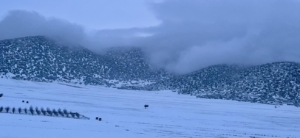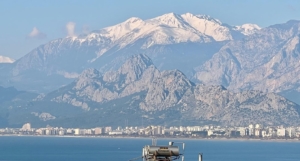A New Thought on Paul’s Tenacity
Rev. Tony Cooke
I’ve often thought of Paul’s grace-empowered ministry… how he found strength from God in spite of the intense challenges and adversities he faced. He said, “I take pleasure in my weaknesses, and in the insults, hardships, persecutions, and troubles that I suffer for Christ. For when I am weak, then I am strong” (2 Corinthians 12:10). That is so counter-intuitive to the natural mind. For someone who didn’t understand the power of God, they would think such a statement was very strange — that he loved experiencing pain.
Reluctantly comparing himself to the false apostles, Paul enumerated much of what he had experienced:
2 Corinthians 12:23-27
23 I have worked harder, been put in prison more often, been whipped times without number, and faced death again and again.
24 Five different times the Jewish leaders gave me thirty-nine lashes.
25 Three times I was beaten with rods. Once I was stoned. Three times I was shipwrecked. Once I spent a whole night and a day adrift at sea.
26I have traveled on many long journeys. I have faced danger from rivers and from robbers. I have faced danger from my own people, the Jews, as well as from the Gentiles. I have faced danger in the cities, in the deserts, and on the seas. And I have faced danger from men who claim to be believers but are not.
27 I have worked hard and long, enduring many sleepless nights. I have been hungry and thirsty and have often gone without food. I have shivered in the cold, without enough clothing to keep me warm.
I have read this so many times over the years, and it has helped me realize that the sacrifices we make today seem pretty miniscule compared to what Paul others through history have endured for the sake of the gospel. What stood out to me recently was not the beatings, whippings, shipwrecks, and imprisonment (which has often stood out to me the most). What grabbed my attention recently is at the very end of that section, where Paul said that he had “shivered in the cold.”
Allow me to explain. When I arrived in Turkey (February 2024), I had a free day before the conference started. While this is my tenth trip to this nation, I had never visited any of the biblical sites on the southern coast. My meetings were in Antalya (Acts 14:25), and I was able to visit two seaports where Paul changed ships during his travels, Patara and Myra (Acts 21:1 and 27:5). When we drove back to Antalya, we did not take the coastal road, but came back a different way — through the Taurus Mountains.
This is an extensive mountain range that Paul would have crossed more than once. Much further east, his hometown of Tarsus was just thirty miles away from a major pass through these mountains. He definitely went through this range with Barnabas on their first missionary journey, enroute to and from the region of Galatia (Acts 13:14; 14:24). If that journey was in colder months, it would explain his statement about shivering in the cold. He also made a relevant statement much later when he wrote to Timothy from a dank prison cell in Rome. He asked his young protégé to “be sure to bring the coat I left with Carpus at Troas” and to “do your best to get here before winter” (2 Timothy 4:13, 21).
The purpose of this letter is not to glorify Paul’s sufferings, but to highlight his sense of fortitude and resiliency when circumstances were not favorable to him. A favorite Scripture of many is Philippians 4:13 — “I can do all things through Christ who strengthens me” (NKJV). Some seem to apply this as “I’ll always hit the winning shot, “I’ll be the one to get the promotion,” or “I’ll definitely ace the next exam.” In other words, we assume that it means we’ll always have a desirable outcome. However, the context is much broader than that (thank God when we hit the winning shot, get a promotion, or ace an exam).
When you read the preceding verses, Paul is including enduring with grace (God’s power) when the outcomes and circumstances are not positive or enjoyable. He thanks them for their gift, and then states, “…I have learned how to be content (satisfied to the point where I am not disturbed or disquieted) in whatever state I am. I know how to be abased and live humbly in straitened circumstances, and I know also how to enjoy plenty and live in abundance. I have learned in any and all circumstances the secret of facing every situation, whether well-fed or going hungry, having a sufficiency and enough to spare or going without and being in want.” (Philippians 4:11-12 AMPC).
In other words, Christ is just as much your conquering Savior when you are struggling to get out of the valley as he is when you are enjoying the mountaintop. I don’t think Paul interpreted God’s love for him or his self-worth based on his outward circumstances at a given moment. He knew those were subject to change. He also knew that obedience sometimes placed him in peril, peril he could have absolutely avoided by not preaching the gospel.
Paul valued earthly things so little, and he knew what genuine treasure was. The acquisition and accumulation of earthly goods did not captivate his heart. He said, “My life is worth nothing to me unless I use it for finishing the work assigned me by the Lord Jesus—the work of telling others the Good News about the wonderful grace of God” (Acts 20:24).
I pray that you have and enjoy every favor and blessing this life has to offer, but more than that, I pray that you find that contentment that Paul had found (it didn’t come naturally to him… he had to learn to be content) in every circumstance. When things are going great and when things are not, I pray that faith abounds in your heart and that you will always declare, “I can do all things through Christ who strengthens me.”
The following pictures are of the Taurus Mountain range in southern Turkey. The first picture is from the near the harbor in Antalya. The other two are taken while driving through them.





